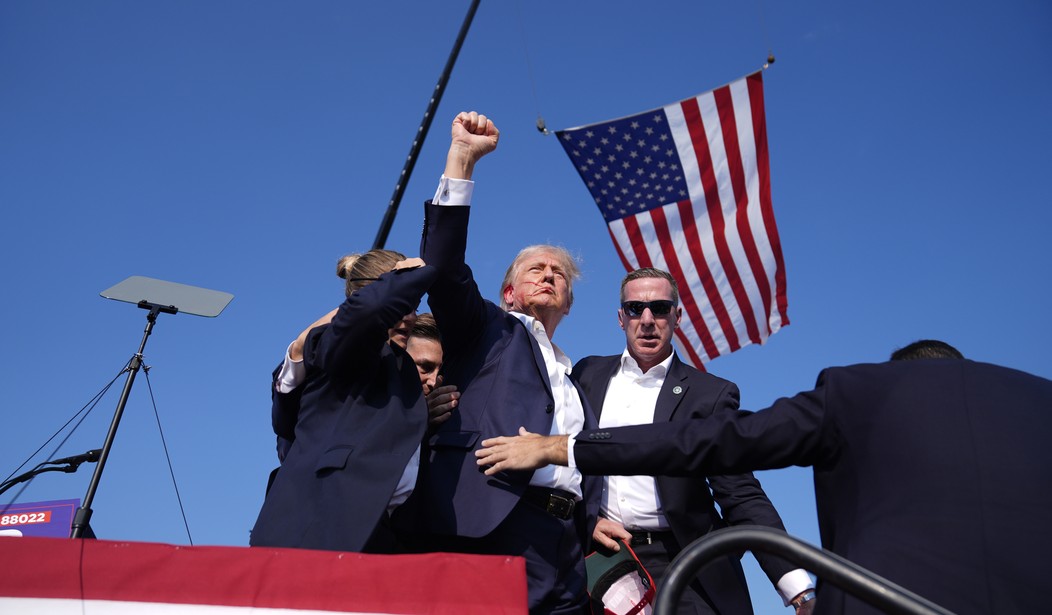It may be months before we know the whole story behind the attempted assassination of former President Donald Trump at a rally in Butler, Pennsylvania. It may be years. We may never know. (Sadly, my money's on the latter.) There are times when the "public's right to know" just seems to slip through our fingers, and this may well be one of those times. We can hope not — but there are murmurings now of evidence tampering. That last is a big, serious assertion — but on Monday, a SWAT counter-sniper who was on the scene testified at a panel discussion held by five Republican members of Congress about an "odd pattern" of evidence handling.
A SWAT counter-sniper who was working the Pennsylvania rally where former President Donald Trump was nearly assassinated last month agreed with Republican lawmakers Monday that an “odd” pattern of evidence-handling had taken place following the deadly shooting.
Washington Regional SWAT counter-sniper Ben Shaffer said it was “absolutely” concerning that the roof of the AGR International building had been quickly scrubbed and gunman Thomas Matthew Crooks’ body disposed of before an official autopsy report could be released.
Five House Republicans — Reps. Andy Biggs and Eli Crane of Arizona, Matt Gaetz and Cory Mills of Florida, and Chip Roy of Texas — hosted the panel discussion with Shaffer and other witnesses at the conservative Heritage Foundation.
BREAKING: Audio From Butler Police Bodycams Shows Frustration at Secret Service Dropping the Ball
That does seem odd. As far as the autopsy, well, Thomas Crooks was the recipient of a 3,200-feet-per-second lobotomy; no matter what else was going on, releasing the autopsy report is pretty much the definition of belaboring the obvious.
So, an "odd" pattern of evidence handling. What happened, aside from the unusually fast disposition of Thomas Crooks' body?
“Do you find it odd that literally only days after the attempted assassination on President Donald J. Trump, while the roof was too sloped to place individuals for counter-sniper operations, that it wasn’t too sloped of a roof for the FBI to go ahead and tamper, in my opinion, with evidence by washing the roof off that may have had significant evidence on it?” Mills asked Shaffer, referring to the chain of events following the July 13 shooting at the Butler, Pa. campaign event which left one audience member dead and three others, including Trump, injured.
“Yes, I do,” Shaffer answered.
I'm not a police officer or a forensics investigator, but it seems like this was done awfully quickly — and Ben Shaffer has forgotten more than I'll ever know about this kind of police work, and he's concerned about what was — or wasn't — done, and how quickly things seem to have been wrapped up. And another thing: Is it normally the role of the FBI to clean up crime scenes? Several companies in Pennsylvania specialize in hazardous materials removal and crime scene cleanup — are those kinds of contractors, not the usual people to clean up the aftermath of a scene like this?
There's more; the examination of Crooks' personal effects also raises some interesting questions.
(Rep. Michael) Waltz said last week that FBI briefings had revealed Crooks’ use of messaging accounts on platforms located in Belgium, Germany and New Zealand.
“Why does a 19-year-old kid who is a health care aide need encrypted platforms not even based in the United States, but based abroad — where most terrorist organizations know it is harder for our law enforcement to get into?” Waltz said at a press conference last week.
“How did he learn to build those IEDs? How did he learn to install remote detonators? How did he conduct those searches and not get popped?” he told The Post the following day. “I still have a lot of questions.”
The encrypted communications seem like the biggest question. You can probably find directions on improvised explosives on the internet, if you know where to look, although I admit detonators would be a bit trickier. But encrypted communications platforms? Based in Belgium, Germany, and New Zealand? What platforms? What kind of platforms? What was sent and received by Crooks? Was he seeking information? Was he awaiting direction? If so, from whom?
Those are the questions we need to have answered — the answers to those questions will tell us if Crooks was, as we suspect, a lone nutcase looking to get his name in the history books, or whether he was part of something larger. The answers to those questions will also tell us who in our law-enforcement system may be compromised — or just corrupt.
We have a right, as citizens, to know those things. Sadly, we'll probably never know those answers.

